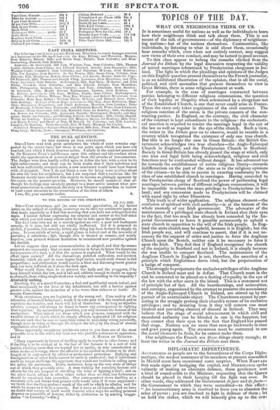TOPICS OF THE DAY.
WHAT OUR NEIGHDOURS THINK OF US.
IT is sometimes useful for nations as well as for individuals to learn how their neighbours think and talk about them. This is not meant of the talk of governments—of the diplomacy of neighbour- ing nations—but of the nations themselves. Communities, like individuals' by listening to what is said about them, occasionally hear remarks which, even when not entirely correct, may suggest new views of their own conduct, and may be turned to good account. To this class appear to belong the remarks elicited from the Journal des Debats by the legal discussion respecting the validity of mixed marriages solemnized by Presbyterian clergymen in Ire- land. The light in which the pleadings and opinions of the Judges on this English question present themselves to the French journalist, is as an additional illustration of the opinion, that in all the social, political, and civil anomalies that present themselves to view in Great Britain, there is some religious element at work.
For example, in the case of marriages contracted between
parties belonging to different religious communions, the question of their legality or illegality when solemnized by a clergyman not of the Established Church, is one that never could arise in France. There the state only takes cognizance of the civil contract. The religious sanction of the union is the private concern of the con- tracting parties. In England, on the contrary, the civil character of the contract is kept subordinate to the religious : the ecclesiasti- cal sanction is required to render the marriage legal in the eye of the law as well as regular in the eye of the church. Such a view, the writer in the Debats goes on to observe would be tenable in a country which recognized the existence of only one true church. But this is no longer the case in Great Britain : the British Go- vernment acknowledges two true churches—the Anglo-Episcopal Church in England, and the Presbyterian Church in Scotland. Society in Great Britain has already passed the stage at which, only one true and legal faith being acknowledged, religious and civil finictions may be confounded without danger. It has advanced too far towards the establishment of entire religious liberty—towards indifferentism on the part of the state as to the religious opinions of the citizen—to be able to persist in exacting conformity to the rites of one established church in marriages. Having conceded to, the Presbyterian clergy of Scotland the power of performing legal marriages between parties of different religious communions, it will be impossible to refuse the same privilege to Presbyterians in Ire- land ; and any concession made to Presbyterians will be claimed with equal right by other Dissenters.
This truth is of wider application. The religious element—the
confusion of spiritual with civil authority—is at the bottom of the whole anomaly of our Irish government. The advocates of the maintenance of a privileged state church in Ireland shut their eyes to the fact, that too much has already been conceded by the Im- perial Government to leave it possible permanently to uphold a state church in opposition to the will of the Irish people. In Eng- land the state church may be upheld, because it is English ; but the Irish people say, and will continue to assert, that if it is not ne- cessary for the support of order and justice to force the Anglican Church upon the Scotch, neither can it be necessary to force it upon the Irish. They feel that if England recognizes the church of the majority in Scotland and not in Ireland, it is simply because she was unable to conquer Scotland. The maintenance of the Anglican Church in England is not, therefore, the assertion of a principle which Englishmen deem vital, but the perpetuation of a badge of conquest.
The struggle to perpetuate the exclusive privileges of the Anglican
Church in Ireland must end in defeat. That Church must in the end be contented to be placed on a footing of equality in the eye of the law with the other sects in the island. This is a statement not of principle but of fact. All the heartburnings, and animosities, and outrages, engendered by the attempt to preserve the ascendancy of the Anglo-Episcopal Church in Ireland, are stirred up by the pursuit of an unattainable object. The Churchmen cannot by per- sisting in the struggle prolong their church's tenure of its exclusive privileges ; and by desisting from it they will remove one most virulent and pervading element of discord in Ireland. They may believe that the stage of social advancement in which civil and sacerdotal authority can be blended in one is the happiest, but they cannot shut their eyes to the fact that England has passed that stage. Nations can no more than men go backwards in time and grow young again. The statesman must be contented to use the social elements he finds, for he cannot make them.
Our neighbours the French see these things clearly enough ; at least the writer in the Journal des Debats sees them.


























 Previous page
Previous page